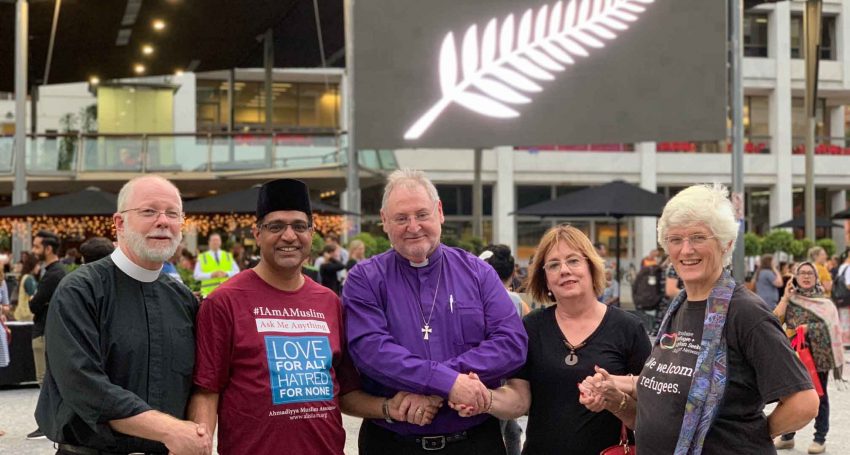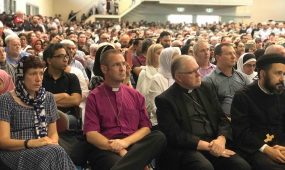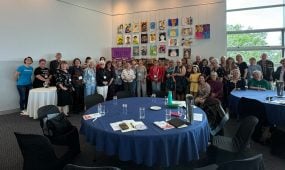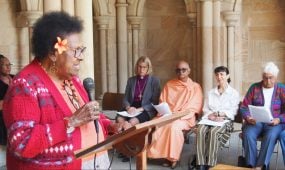New territory – Christchurch massacre reflection
Reflections
Bishop Cam Venables reflects upon the Christchurch Mosque terrorist attacks and suggests that we are in ‘new territory’: “Maybe a sleeping giant of compassion will now wake in the hearts and minds of all – breaking the self-imposed shackles of apathy, indifference and perceived powerlessness?”

On Friday 15 March 2019, a 28-year-old Australian man shot dead 50 people in Christchurch, New Zealand. In addition, he wounded 48 others, with a number of these critically injured. And, as he shot women, children, and men…he filmed what he saw and gloated, posting it on social media. It seems inconceivable that people could be murdered as they gathered for prayer in the peaceful city of Christchurch…and, yet it has happened. Consequently, I think we find ourselves in new territory.
Advertisement
I think we are in new territory because many of us may have previously thought that terrorist acts of this scale could only be perpetrated by those who had been radicalised through extremist Islamist teaching. Teaching that states a particular group are to blame for the problems that exist. Teaching that denies any understanding of a shared humanity through caricature, hate-filled speech and deception. Teaching that promulgates the notion that those considered ‘other’ are ‘the problem’ and are ‘evil’. Teaching that suggests how best to defeat, or dispose of, those considered ‘other’.
But, it is now uncomfortably clear that people can be radicalised through extremist right-wing ideology, including White Supremacist teaching. Teaching that states a particular group – in this case the Muslim community – are to blame for the major problems of society. Through caricature, hate-filled speech and deception, the humanity of those who are Muslim has been minimised, resulting in a white Australian male murdering 50 people in New Zealand. It has resulted in him trying to justify the evil because the men, women and children he murdered were Muslim!
Related Story
 News
News
Faith leaders united in prayer for Christchurch victims
There may be many layers to this ‘new territory’ for us, and some of these come from the deep friendship that exists between Australia and New Zealand. Each year on Anzac Day, we are reminded of the origins of this. New Zealanders work in Australia, and we work in New Zealand. New Zealanders come to the Gold Coast for holidays, and Australians go skiing in Queenstown. Both countries share a friendly rivalry in rugby union, although the New Zealand national team are consistently better than our own. Surely we – the people of Australia and the people of New Zealand – are family. So, this horrific violence has been perpetrated by one family member against another family member.
I think most would agree that it’s not possible to justify what has been done…and the potential for further violence is possible. Could it provoke retaliatory attacks against churches from those who believe that Christians are the problem? Or, could it provoke copy-cat attacks against mosques in other places?
I think this is new territory, at least for us in Australia. Maybe a line has been crossed, and there is new awareness of where unchallenged xenophobia can lead? Maybe a sleeping giant of compassion will now wake in the hearts and minds of all – breaking the self-imposed shackles of apathy, indifference and perceived powerlessness?
As Anglican Christians, we might ask ourselves what Jesus might have done in response to this? We might even have a sense of how God is calling us to respond as individuals, as congregations, and as a church? I do not think that we are called to hide under the covers hoping that things will get better by themselves, or throw our hands up in the air thinking that we are powerless to do anything worthwhile! Instead, maybe we are called to acknowledge the challenge and complexity, before praying, ‘Here I am – what do you want me to do?’
I think there are at least the three ways that we can constructively respond.
- Relationally: Firstly, I think many of us have friends who are Muslim – and, even though the massacre happened in New Zealand, it was an attack on the broader Muslim community. There have been great opportunities to meet together with Muslim friends at local mosques and churches since the massacre happened – and these have each affirmed a shared humanity. However, I think it is also worth personally touching base with Muslim friends through emails, phone calls, and meals over the next few weeks. In addition, there are many Muslims in our community whom we know about, but have no particular relationship with. They are our work colleagues, sporting team members, fellow students in schools and universities, and health professional peers…but, we may share life with them at a distance. We could each reach out to at least one of these, expressing the thought that ‘What happened in New Zealand was horrific,’ and asking, ‘How are you going?’
- Culture changing: It is relatively easy to recognise speech and behaviour that create or perpetuate division and prejudice, but it is much harder to challenge these things. When a work colleague, or family member, labels people of a particular group as ‘Rubbish!’, ‘Useless!’, ‘Terrorists!’, ‘Bludgers!’ etc – then we need to challenge this. The group they refer to could be ‘The Muslims!’, ‘The Asians!’, ‘The Aboriginals!’, ‘The gays!’, ‘The refugees!’, ‘The Africans!’ – we know that there are many considered ‘other’ in our society. Surely, we need to articulate and demonstrate a counter narrative that affirms a shared humanity and our equal value?
- And the third thing, of course, is to pray: Praying for those who grieve the loss of loved ones, and those who have been injured. Praying for compassion and wisdom in all expressions of leadership. And, praying for the grace to make our own contribution to peace-making, even when that is difficult.
Amen.





